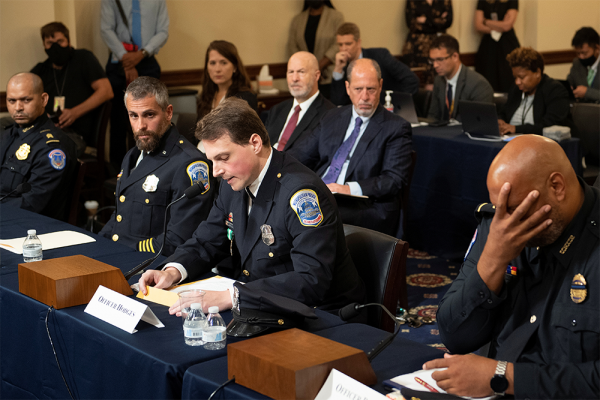Even in the midst of our lands groaning for their future restoration (Romans 8:22), the body of Christ dismantles the colonial systems that have privatized God’s creation. For in Christ, land and resources are not meant to be segregated but rather shared through hospitality for the flourishing of local communities, especially for the vulnerable and oppressed among us (1 John 3:17-18). In this way, Christ’s body is a new ecology between all lands, nations, and peoples through a common love for each other.
In an emotional congressional hearing Tuesday morning, witnesses of the Jan. 6 insurrection on Capitol Hill used multiple words to describe those who attacked them: One was “terrorists;” another was “Christians.”
“It was clear the terrorists perceived themselves to be Christians,” Metropolitan police officer Daniel Hodges stated in his testimony, which graphically described the physical attacks on Hodges and other officers.
Home Video is not a Christian album, but I didn’t really want it to be. There are songs for VBS, but these are songs about VBS. We need both.
“Through Devastating Storms” was written for the opening worship service on Aug.1 for the national Presbyterians for Earth Care online conference, “Creation Care Buffet: Come to the Table.” The hymn recognizes the record-breaking heat waves and forest fires in the West and Northwest United States and hurricanes and massive flooding worldwide. It is a prayer that we will love the Earth and love each other, and so work for healing and hope.
Rustin, who died in 1987, is best known for helping Rev. Martin Luther King Jr. implement Gandhian tactics of nonviolence and for the key role he played organizing the 1963 March on Washington and the Southern Christian Leadership Conference — two key components of the civil rights movement.
Less well-known are the particularities of Rustin's faith, including his deep roots in the Quaker and African Methodist Episcopal churches which drove his activism. Those two faith traditions, marked by silence and singing, respectively, echoed throughout Rustin’s life and work.
There’s more than one way to tell a story. As journalists, we know this well. As readers, you know this well. The news this week gave us ample opportunities to remember that stories can be told with different — sometimes even contradictory — purposes.
The spiritual and psychological harm of conversion therapy is indeed intense. Rodgers gives an insider’s account in her new memoir Outlove and Pray Away, which premieres on August 3. Her survival story will appeal to readers and viewers whether they are LGBTQ and Christian, one or the other, or none of the above.
According to a new report, 1.5 million children lost at least one primary caregiver to COVID-19 by the end of April 2021.
Children: The Hidden Pandemic 2021 — a joint report by the Centers for Disease Control and Prevention, the United States Agency for International Development, and World Without Orphans, in conjunction with other global child welfare experts — stated that, without immediate action, “the COVID-19 pandemic is destined to leave millions more children orphaned.”
Indigenous people knew the graves were there. Canada’s investigation, the Truth and Reconciliation Commission, which ended in 2015, contained a large section on unmarked graves. Survivors in Canada and the United States talked about these mass graves, but people didn’t hear them, so when the graves were uncovered, people were shaken. But that level of emotional intensity is hard to maintain. The emotions the news elicits are painful — so after the speeches and the promises, equilibrium is restored and things go back to normal. To business as usual.
My doctor's reaction to my disorder was rare. When he noticed that my prescriptions were running out faster than they should, he did not shame, blame, or accuse me of any grave moral failing. With kindness and compassion, he noted that I had developed an addiction and immediately assured me that I had done nothing wrong.









